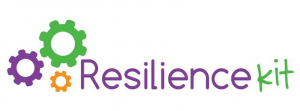It’s important for parents to look for ways to demonstrate resilience at home, at school and in other environments. Parents are the first and most important example of a healthy response to anxiety-provoking situations.
Although we all feel anxious from time to time, parents often ask how to help their child navigate those feelings.
Because your mental health affects your child’s mental health, it’s important to learn and demonstrate healthy ways to cope with challenging or anxiety-provoking situations. It’s kind of like putting the oxygen mask on yourself first, before helping your child.
By exemplifying resilience, you can help your child develop and imitate healthy coping skills to prevent and reduce anxiety. Here are three things you can do:
1. Show Your Weaknesses
When you talk to your child about your struggles, this makes it okay to be vulnerable. Talk about a time when you felt worried and how you overcame it. Being willing to share fosters a safe environment for your child be themselves and talk about their feelings, without fear of judgement.
2. React Positively to Failure in the Moment
Talk about a time when you failed, and how you overcame it. Because failure is inevitable, reacting in a positive manner demonstrates that failure is not connected to our worth or confidence. As the saying goes, “If you fail, never give up because F.A.I.L. means First Attempt In Learning.”
3. Take Time Out for Yourself
Allowing yourself time for self-care is not selfish as it strengthens your mental health. When you are mentally healthy, you will find more opportunities to give your loved ones the attention and genuine connection they need.
Learn Coping Skills to Build Resilience in Your Family


